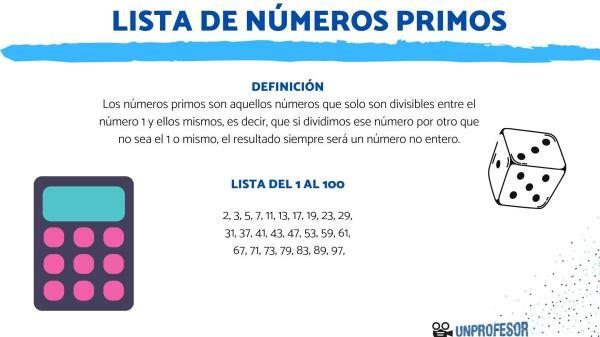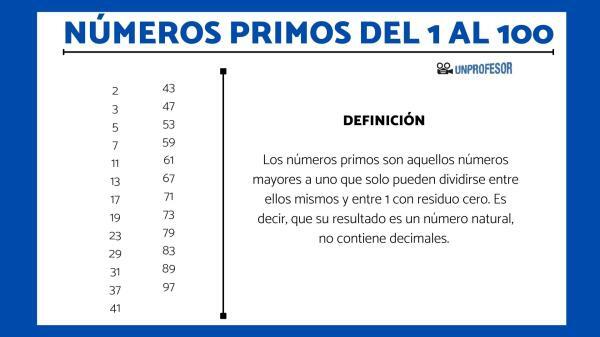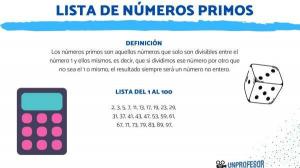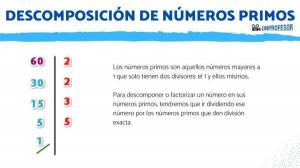What are the prime numbers from 1 to 100

In this new lesson that we bring you from unProfesor, we are going to study an essential topic in mathematics, which deals with prime numbers. To do this, we will start by defining the concept of a prime number, so that later we can see the list of prime numbers from 1 to 100. At the end, we will finish the lesson with some practical exercises and their respective solutions, to confirm that what has been explained throughout the article has been understood.
Index
- What are prime numbers
- What are the prime numbers from 1 to 100
- examples of prime numbers
- Prime number exercises
- Solution
What are prime numbers.
The Prime numbers are those numbers greater than one that they can only be divided among themselves and enter 1 with zero remainder. That is, its result is a natural number, it does not contain decimals. The opposite is known as a composite number. At present, as can be inferred from the initial definition, the number 1 is not considered a prime number. A curiosity is that there are infinitely many prime numbers.
Prime numbers are very useful when solving the problem. least common multiple or the greatest common divisor of a group of numbers, since it is calculated by factoring those numbers into prime numbers.
How do you know if a number is prime?
To know if a number is prime or not, we have to divide it by a number other than 1 or itself and, once we have the result, we can distinguish if it is a composite number in the event that it exists some natural result, or a prime number in case we don't find any answer that is a number natural.

What are the prime numbers from 1 to 100.
The list of prime numbers from 1 to 100 is as follows:
- 2
- 3
- 5
- 7
- 11
- 13
- 17
- 19
- 23
- 29
- 31
- 37
- 41
- 43
- 47
- 53
- 59
- 61
- 67
- 71
- 73
- 79
- 83
- 89
- 97

Examples of prime numbers.
Currently, prime numbers are in our day to day. For example, the security of electronic communications carried out on a daily basis comes thanks to the prime numbers, since the messages are encrypted and only the receiver can decrypt. How? Well, encryption is a very large number of which only the receiver has the divider that allows it to be decrypted.
let's see a numerical example:
- The number 6 can be divided by 1, by 2, by 2 and by 6, so it is not considered a prime number.
- The number 5 can only be divided by 1 and 5, so it is prime.
As you can see, if we find the divisors of the number that we want to know if it is prime, we have to look in which those divisors are only 1 and itself so that it is considered prime, because otherwise it will be considered compound.
Prime number exercises.
Once you have finished the lesson of the prime numbers from 1 to 100, you can solve the practical exercises that are proposed now so that you can put your acquired knowledge to the test. In the next section you will be able to check your results with the provided solutions.
1. Identify which of the following numbers are prime:
- 1
- 3
- 8
- 9
- 12
- 13
- 19
- 22
- 25
- 31
2. Justify if the following sentences are true or false:
- Prime numbers are always natural numbers.
- The smallest prime number that exists is 1.
- The opposite of prime numbers are composite numbers.
Solution.
Let's see if you've done the exercises correctly:
1. Identify which of the following numbers are prime:
- 1: is neither prime nor composite.
- 3: is cousin.
- 8: is composite.
- 9: is composite.
- 12: is composite.
- 13: is cousin.
- 19: is cousin.
- 22: is composite.
- 25: is composite.
- 31: is cousin.
2. Justify if the following sentences are true or false:
- Prime numbers are always natural numbers: true, because they cannot be negative numbers or decimals.
- The smallest prime number that exists is 1: false, because one is neither prime nor composite, so the smallest prime number that exists is 2.
- The opposite of prime numbers are composite numbers: true, are those numbers that can be divided by themselves, by 1, and by one or more other numbers.
If this article has been helpful to you, do not hesitate to share it with your classmates and continue browsing the website of a Teacher.
If you want to read more articles similar to What are the prime numbers from 1 to 100, we recommend that you enter our category of Basic concepts.


